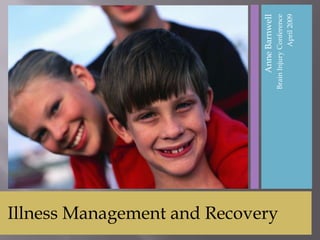
Bia Conference Ppt 2007 Version 4 3 07
- 1. Anne Barnwell Brain Injury Conference April 2009 Illness Management and Recovery
- 2. Acknowledgements This presentation is based on the work of Dr. Kim Mueser and Susan Gingerich, co-authors of the Illness Management and Recovery Toolkit; The Illness Management and Recovery Practitioners Workbook, US Department of Human Services; “Philosophy of Rehabilitation” by Al Condeluci Ph.D and Marty McMurrow, MS, CBIS Training Manual And the training and mentoring offered by Anastasia Cyptar, Quality Assurance Director for People Incorporated
- 3. Overview Importance of understanding the entire person Traditional goals of brain injury rehabilitation How an Illness Management and Recovery Program works Review of Educational Modules of IMR Implications for future practice
- 4. Recovery from brain injury involves healing the entire person Physically Socially Vocationally Emotionally Cognitively Spiritually
- 5. IMR works with the psychosocial components of brain injury Anxiety and Depression Substance Abuse that predates or is a consequence of brain injury Ongoing mental health symptoms that are a consequence of brain injury
- 6. Goals of Brain Injury Rehabilitation Independence – this contrasts with dependence, focuses on people accomplishing tasks by and for themselves Interdependence – This paradigm focuses on importance of partnerships between individuals that benefit both parties (Condeluci 1991)
- 7. Independence and Interdependence Independence Interdependence
- 8. Goals of Brain Injury Rehabilitation Integration – this contrasts with segregation, it involves participation in society, but can focus on bringing the behavior and appearance of people with disabilities more in line with community norms Inclusion – the inclusion of all people into the community; society creates supports that fit the person; includes curb cuts
- 9. Integration and Inclusion Integration Inclusion
- 10. Goals of Brain Injury Rehabilitation Self Determination – the practice of individuals with disabilities making important decisions in their lives Productivity– the value of work or study in peoples lives and receiving appropriate wages for that work
- 11. Self Determination and Productivity Self Determination Productivity
- 12. Recovery for Individuals with Mental Illness Recovery is both a process and an outcome of learning to have a meaningful life Recovery involves having hope, expectations, respect, well-being, and confidence
- 13. Background of IMR Practice Illness Management and Recovery is one of the six evidence based practices used in mental health rehabilitation today The concepts in IMR are based on the results of extensive research on effective psychosocial rehabilitation techniques and programs
- 14. Components of Illness Management and Recovery Programs Psychoeducation Medication education Illness relapse prevention Coping skills training Social skills training
- 15. Illness Management and Recovery Educational Process Individual sessions or small groups Standard format for all sessions Homework based on recovery goals Motivational interviewing, behavioral shaping, positive reinforcement Repetition for better learning
- 16. How do individuals succeed in growing their vision of recovery into a new reality?
- 17. IMR Recovery Skills Summary Learning to cope with stress Building Social Support Developing a Relapse Prevention Plan Using Medication Effectively Learning to cope with mental health symptoms Getting needs met in the mental health system
- 18. Creating a Vision of Life in Recovery
- 19. When choosing a recovery goal IMR participants are asked What do you want your world to look like?
- 20. Setting Recovery Goals Recovery goals can be any size from “I want a cat” or “I want to run a business” Respect each person’s priorities Make the vision real – use all senses Create a visible image of what recovery means by making a drawing or in putting it in writing
- 21. Understanding Signs and Symptoms of Mental Illness
- 22. Understanding Mental Illness Offering a message of hope and recovery to all individuals with mental illness Basic Facts on Depression, Bipolar Disorder, Schizophrenia Identifying personal beliefs about mental illness Challenging stigma and misconceptions about mental illness
- 23. Stress Vulnerability Model of Mental Illness
- 24. Stress Vulnerability Model Both stress and biology contribute to the symptoms of mental illness How stress can affect the symptoms of mental illness Strategies for reducing biological vulnerability to relapse of mental illness symptoms
- 26. Building Social Support Self assessment of level of social support and personal desire for change Opportunities for finding support Training in initiating connections and maintaining friendships
- 27. Recovery Approaches to Drug and Alcohol Use
- 28. Drug and Alcohol Use Why people use controlled substances – social needs, symptom management Self Assessment – what substances people use and what function it has in their lives Pros and Cons – concept of harm reduction Personal decision and resources for change
- 29. Reducing relapses and mental health hospitalizations
- 30. Avoiding Symptom Relapse “Mental Illness is for many a chronic, relapsing and remitting condition” Education about triggers and warning signs Self assessment and personal relapse prevention plan Personal recovery choices and resources for change
- 32. Using Medications Effectively Self assessment of beliefs about medication Personal experiences with medication Education about types of medications Pros and cons of using medication Personal medication plan Strategies for taking medication consistently
- 33. Managing Stress
- 34. Understanding Stress Understanding the signs and symptoms of stress and relationship of stress to mental health symptoms Self assessment of level of stress Education about the sources of short and long term stress Personal stress management strategies
- 35. Coping with ongoing symptoms or problems
- 36. Coping with Problems and Persistent Symptoms Skill training on solving problems Self Assessment of ongoing mental health symptoms Skill training using problem solving to manage ongoing mental health symptoms or behaviors
- 37. Living a Life in Recovery requires Knowledge Coping skills Effective medical care Social Support Life with Hope
- 38. Final Thoughts on Facilitating Recovery Illness Management and Recovery practices provide a useful addition to rehabilitation strategies for the mental health components of brain injury Adding Recovery to the basic values of brain injury rehabilitation will bring more hope and meaning to the lives of people we serve